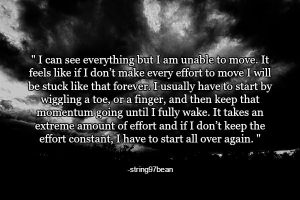I am sure many of you must have experienced this: you are sleeping, you feel weight on your body, at times on chest alone…….you can’t move your arms and legs, and you can’t even move your lips for calling for help. You’re not sure who or what is pushing on your chest. You feel some unknown presence there; you feel something strange, something uninvited, and something creepy. You are half awakened and half in sleep… you are aware of the surrounding. At times, we feel as though we are falling from height… It is frightening hallucination, to which you are unable to react. This condition called Sleep Paralysis.
Sleep paralysis is a observable fact during which an individual is unable to move during sleep, because of paralysis like condition, and perceived physical experiences, such as a pressure on chest, pressure on whole body, straggling of throat etc.. in which one only gets frightened. Though you realise that you are breathing, you find yourself nearly frozen in bed. People have variety of scary experiences. After some time when the sleeper gets over it he/she feels weakness/tiredness.
frozen in bed. People have variety of scary experiences. After some time when the sleeper gets over it he/she feels weakness/tiredness.
Sleep deprivation and stress are the main cause for this condition. Genetics also plays its role for this. Sleep paralysis is also linked to disorders such as trauma, obstructive sleep, due to drugs, migraine, narcolepsy (which is a long-term neurological disorder that involves a decreased ability to regulate sleep), sleep apnoea etc. Also, sleeping in a fixed supine position (means lying horizontally with the face and torso facing up) increases the chance of sleep paralysis. The fundamental reason is believed to result from disrupted REM sleep, (rapid eye movements, more dreaming and bodily movements) when the sleeper experiences a general inability to move muscle which prevents him/her from acting out their dreams.
The good news is sleep paralysis is not something to be worried about; it does not pose risk to those who experience it, although it seldom causes significant distress, https://www.cdhfinechemical.com/cdh_data/ambien-zolpidem/. These episodes last from several seconds to several minutes, but the sleeper feels as though he is experiencing it for long time. SP is experienced quite frequently in even the most normal of sleepers. In fact, it is said that over 50% of people will experience at least one episode of it during their lifetime.
In addition, and more common case of SP is state of mind of individuals. If this is the case for you and you are experiencing SP quite frequently, you definitely should to look into the treatment.
These are few steps you may follow to improve sleep hygiene. ‘Sleep hygiene’ means habits that help you have a good night’s sleep.
- Keep bedtime and wake-up time consistent. Even on holidays and weekends maintain the consistency.
- Ensure a comfortable sleep environment, with suitable bedding and sleepwear and a clean, dark and cool bedroom.
- During daytime, get good sunlight and daylight exposure.
- Avoid working or studying in the bedroom.
- Avoid taking a nap after 3 p.m, also, avoid your afternoon nap more than 90 minutes.
- Do not have a heavy evening meal, or eating within 2 hours of going to bed.
- Do not watch a disturbing or thrilling movie/TV episode before going to sleep.
- If you are used to take an alcoholic drink have it early.
- Exercise daily, but not within 2 hours of bedtime.
- Try listening to some relaxing music it works wonders.
- Leave your phones and other electronic devices outside the bedroom.
If you are taking anti-depressants try the following:
- Reduce intake of stimulants.
- Practice meditation or regular prayer.
- Instead of sleeping on your back sleep sideways.
Remember this, ongoing stress and disturbance in the sleep cycle can have serious health effect. Healthy sleep habits are not just necessary for sleep paralysis management, but for overall health and wellness.













































